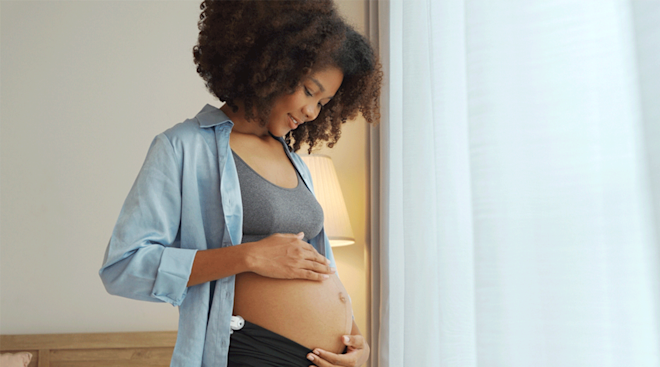
Prenatal Vitamins: Benefits and Side Effects
Every pregnant mom knows she should be popping prenatal vitamins. For years, doctors and experts have been encouraging moms-to-be to take them, often before they even conceive. But, she might not be aware of exactly what are the benefits of prenatal vitamins—or their side effects.
Prenatal vitamins are multivitamins that include a variety of vitamins and minerals. They help provide the critical components necessary to nourish a pregnant woman’s body and support the development of her growing baby. “Their main purpose is to supplement a patient with necessary nutrients and vitamins that she may not be getting in her diet in an effort to optimize pregnancy,” says Sara Twogood, MD, an ob-gyn at the University of Southern California and founder of the postpartum care package service Après Push. “With a well-rounded, healthy diet full of fruits and vegetables, whole grains and legumes, patients probably get an adequate amount of vitamins. However, it’s estimated that 80 percent of people living in the US do not eat a diet that fulfills their nutritional needs. This is where a prenatal vitamin comes in.”
As a holistic nutritionist and promoter of fresh (as opposed to processed) foods, Carley Mendes, prenatal nutritionist and founder of Oh Baby Nutrition, suggests always aiming to meet nutrient needs through whole foods first. “Supplementation is never a replacement for a nutrient-dense food, but there are times when vitamins are highly recommended, and pregnancy is one of those occasions,” she says. “Prenatal vitamins are formulated specifically to support a woman’s nutritional needs during pregnancy and replenish her stores after having a baby, especially if you follow a strictly plant-based diet, have chronic stress or if you were on hormonal birth control before becoming pregnant.”
So when should women start taking prenatal vitamins? Twogood recommends starting daily prenatal vitamins one month before trying to conceive and continuing them throughout the first trimester of pregnancy. Mendes says that starting before you become pregnant can help prepare your body. “Certain nutrients, such as folate, are most important in the early stages of pregnancy,” says Mendes, who is also the creator of In the Glow, a nutrition series for pregnant women.
What sets prenatal vitamins apart from regular multivitamins is usually the higher amount of folic acid and iron. Prescription prenatal vitamins often contain additional ingredients or nutrients—perhaps extra omega-3s or a stool softener called Colace or extra iron—to make themselves marketable or slightly different from OTC prenatal vitamins, explains Twogood. “For most women, over-the-counter prenatal vitamins will do just fine,” she says. “If your doctor is recommending a specific prescription prenatal vitamin, I would ask what is different about the one they are recommending. Another factor is cost. Sometimes prescription prenatal vitamins with omega-3s included will be covered—or partially covered—by insurance and cheaper than buying prenatal vitamins and omega-3s over the counter.”
The ingredient doses in prenatal vitamins may vary, but the key ingredients won’t change drastically. Avoid artificial extras, such as artificial colors, while keeping an eye out for the important nutrients, below. If you have concerns about choosing the right prenatal vitamins, talk with your doctor about your specific needs.
• Folic acid, a B vitamin, has been shown to decrease the incidence of neural tube defects, like spina bifida.
• Iron can prevent or help restore iron deficiency anemia (the most common type of anemia). It’s crucial during pregnancy as blood volume increases up to 40 to 50 percent, and iron is used to transport oxygen throughout your body and to your baby.
• Calcium is necessary for your fetus to develop healthy bones and vascular and muscle functions. If there isn’t enough calcium coming from the mother’s diet, your body takes calcium right out of the stores in your own bones in order to provide enough for the baby.
• Vitamin A promotes vision development.
• B vitamins are mostly used for metabolism and maintenance of healthy cell function.
• Vitamin C helps prevent oxidative stress and supports your immune system, which is often taxed during pregnancy.
• Vitamin D aids in calcium absorption. Research suggests that women with insufficient levels of vitamin D have a harder time getting pregnant compared to those with healthy levels.
• Omega-3s (DHA and EPA) are needed for brain growth and development. They also help reduce inflammation, and some studies suggest a decrease in preterm birth, fetal growth restriction, preeclampsia and gestational diabetes when supplementation is added during pregnancy.
The most notable benefits of prenatal vitamins are that they support the health and development of your growing baby. But prenatal vitamins benefits extend beyond that to provide additional perks as well. The most obvious might have you asking, “Does a prenatal vitamin help hair grow?” The answer is no—it’s actually the high estrogen levels during pregnancy that prevent hair from falling out at its normal rate, explains Mendes. However, what it does also do is reduce the risk of a whole array of conditions, from the annoying to the harmful, including:
- Anemia
- Fatigue
- Leg and muscle cramps
- Low immunity
- Postpartum depression
- Weakness
- Low appetite
- Skin irritation
- Brain fog
You experience lots of changes in your body when you’re having a baby, so it might be hard to distinguish which are prenatal vitamins side effects and which are pregnancy symptoms. Some prenatal vitamins side effects may, in fact, be similar to what you’d feel as your hormone levels shift. In most cases, though, the effects are quite small (if you even feel them at all), particularly compared to the huge advantages you reap from taking them. The most common side effects of prenatal vitamins include:
• Nausea. To avoid this, Twogood recommends taking your prenatal vitamins with food (and never on an empty stomach). It also helps to take them at night, “so you are asleep when the nausea would potentially kick in,” she says.
• Constipation. You have the iron content to thank for this.
• A change in urine color or odor. B vitamins, in particular, may be the contributing factor, though these are harmless changes.
If any of these prenatal vitamin side effects become problematic, consult your doctor. She may suggest prenatal vitamins that might help you feel more comfortable while still keeping your growing baby safe and healthy.
Updated September 2017
Please note: The Bump and the materials and information it contains are not intended to, and do not constitute, medical or other health advice or diagnosis and should not be used as such. You should always consult with a qualified physician or health professional about your specific circumstances.
Navigate forward to interact with the calendar and select a date. Press the question mark key to get the keyboard shortcuts for changing dates.



















































